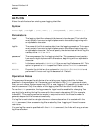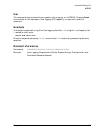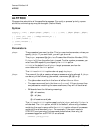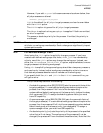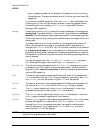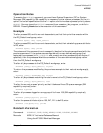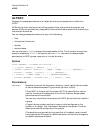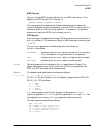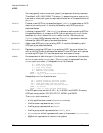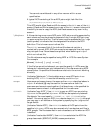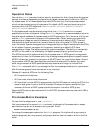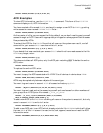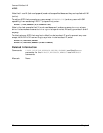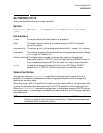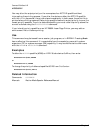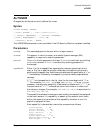
72 Chapter 2
Command Definitions A-B
ALTSEC
You may specify two or more user types if you separate them by commas.
The default is R,L,W,A,X:ANY. The colon (:) separating one or more modes
from one or more user types is required punctuation in the specification of
fileaccess.
NEWACD Creates a new ACD for the specified object. NEWACD is used when an ACD
does not currently exist. It must be followed by valid ACD pair(s) as
described below.
REPACD Indicates "replace ACD". Use REPACD to replace an entire existing ACD for
the specified object, or to copy an ACD from an existing objectname to the
specified objectname where objectname refers to a file. (You cannot use
REPACD to copy ACDs between devices.) The REPACD parameter must be
followed by valid ACD pair(s) as described below.
ADDPAIR Adds a new ACD pair to an existing ACD. It must be followed by valid
ACD pair(s) as described below.
REPPAIR Replaces an existing ACD pair in an existing ACD. You must follow this
with a valid ACD pair(s) as described below. A new ACD pair will replace
an existing ACD pair if it has the same user and account name.
acdpair An access control definition pair. Like the fileaccess parameter this consists
of a modes part and a userspec part. The modes part is separated from the
userspec part by a colon (:). Acceptable modes for files are:
R : read file access
W : write file access
L : lock file access
A : append file access
X : execute file access
NONE : no access
RACD : copy or read the ACD permission
Acceptable modes for directories are:
CD : create directory entries access
DD : delete directory entries access
RD : read directory entries access
TD : traverse directory entries access
NONE : no access
RACD : copy or read the ACD permission
File ACD pairs may contain R, W, L, A, X, NONE, and RACD. Directory
ACD pairs may contain CD, DD, RD, TD, NONE, and RACD.
The userspec part consists of
• a fully qualified user name (username.accountname)
• the file owner represented as $OWNER
• the file group represented as $GROUP
• the file group mask represented as $GROUP_MASK
• @.accountname, which represents all users in the account accountname
• @.@, which represents all users in the system



